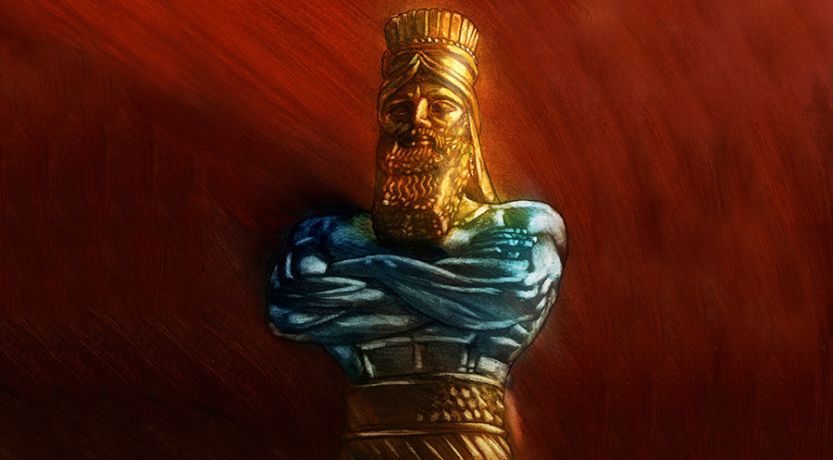This then became the concept of Zionism: “the secularization of . . . Jewish messianism,”
How Did the Jews Originate?
and Why Judaism Should Interest Us
5, 6. What, briefly, is the history of the origin of the Jews and their name?
5 Generally speaking, the Jewish people are descendants of an ancient, Hebrew-speaking branch of the Semitic race. (Genesis 10:1, 21-32; 1 Chronicles 1:17-28, 34; 2:1, 2) Nearly 4,000 years ago, their forefather Abram emigrated from the thriving metropolis of Ur of the Chaldeans in Sumeria to the land of Canaan, of which God had stated: “I will assign this land to your offspring.” (Genesis 11:31–12:7) He is spoken of as “Abram the Hebrew” at Genesis 14:13, although his name was later changed to Abraham. (Genesis 17:4-6) From him the Jews draw a line of descent that begins with his son Isaac and his grandson Jacob, whose name was changed to Israel. (Genesis 32:27-29) Israel had 12 sons, who became the founders of 12 tribes. One of those was Judah, from which name the word “Jew” was eventually derived.—2 Kings 16:6.
6 In time the term “Jew” was applied to all Israelites, not just to a descendant of Judah. (Esther 3:6; 9:20) Because the Jewish genealogical records were destroyed in 70 C.E. when the Romans razed Jerusalem, no Jew today can accurately determine from which tribe he himself is descended. Nevertheless, over the millenniums, the ancient Jewish religion has developed and changed. Today Judaism is practiced by millions of Jews in the Republic of Israel and the Diaspora (dispersion around the world). What is the basis of that religion?
This strictly monotheistic concept of a personal God dealing directly with humans was unique in that ancient world, and it came to form the basis of the Jewish religion.—Genesis 22:15-18; 26:3-5; 28:13-15; Psalm 89:4, 5, 29, 30, 36, 37 (Psalm 89:3, 4, 28, 29, 35, 36, NW).
To carry out His promises to Abraham, God laid the foundation for a nation by establishing a special covenant with Abraham’s descendants.
Moses fulfilled the vital role of mediator of the Law covenant given by God to Israel, in addition to being their prophet, judge, leader, and historian.—Exodus 2:1–3:22.
Judaism Under Roman Rule
With the destruction of the temple, the Sadducees disappeared, and the oral law that the Pharisees had championed became the centerpiece of a new, Rabbinic Judaism.
22 With the destruction of the temple, the Sadducees disappeared, and the oral law that the Pharisees had championed became the centerpiece of a new, Rabbinic Judaism.
Judaism Through the Middle Ages
From “Enlightenment” to Zionism
They rejected the idea of a personal Messiah who would lead the Jews back to Israel and began to work on establishing a Jewish State by other means.
This then became the concept of Zionism: “the secularization of . . . Jewish messianism,” as one authority puts it.
28 The murder of some six million European Jews in the Nazi-inspired Holocaust (1935-45) gave Zionism its final impetus and gained much sympathy for it worldwide. The Zionist dream came true in 1948 with the establishment of the State of Israel, which brings us to Judaism in our day and to the question, What do modern Jews believe?
God Is One
29 Simply put, Judaism is the religion of a people. Therefore, a convert becomes part of the Jewish people as well as the Jewish religion. It is a monotheistic religion in the strictest sense and holds that God intervenes in human history, especially in relation to the Jews. Jewish worship involves several annual festivals and various customs.
30 This belief in one God was passed on to Christianity and Islām. According to Dr. J. H. Hertz, a rabbi: “This sublime pronouncement of absolute monotheism was a declaration of war against all polytheism . . . In the same way, the Shema excludes the trinity of the Christian creed as a violation of the Unity of God.”f But now let us turn to Jewish belief on the subject of the afterlife.
Judaism and God’s Name
38 Judaism teaches that while God’s name exists in written form, it is too holy to be pronounced.i The result has been that, over the last 2,000 years, the correct pronunciation has been lost. Yet, that has not always been the Jewish position. About 3,500 years ago, God spoke to Moses, saying: “Thus shall you speak to the Israelites: The LORD [Hebrew: יהוה, YHWH], the God of your fathers, the God of Abraham, the God of Isaac, and the God of Jacob, has sent me to you: This shall be My name forever, this My appellation for all eternity.” (Exodus 3:15; Psalm 135:13)
Do Jews Still Await the Messiah?
45. What Biblical basis is there for believing in a Messiah?
45 There are many prophecies in the Hebrew Scriptures from which Jews over 2,000 years ago derived their Messianic hope. Second Samuel 7:11-16 indicated that the Messiah would be of the line of David. Isaiah 11:1-10 prophesied that he would bring righteousness and peace to all mankind. Daniel 9:24-27 gave the chronology for the appearance of the Messiah and his being cut off in death.
47 Yet, as The New Encyclopædia Britannica notes, the Messianic hope was vital in holding the Jewish people together throughout their many ordeals: “Judaism undoubtedly owes its survival, to a considerable extent, to its steadfast faith in the messianic promise and future.”
They began to view the Messianic message as a liability and so reinterpreted it merely as a new age of prosperity and peace. Since that time, although there are exceptions, Jews as a whole can hardly be said to be waiting for a personal Messiah.
48 This change to a non-Messianic religion raises serious questions. Was Judaism wrong for thousands of years in believing the Messiah was to be an individual? Which form of Judaism will aid one in the search for God? Is it ancient Judaism with its trappings of Greek philosophy? Or is it one of the non-Messianic forms of Judaism that evolved during the last 200 years? Or is there yet another path that faithfully and accurately preserves the Messianic hope?
49. What invitation is made to sincere Jews?
49 With these questions in mind, we suggest that sincere Jews reexamine the subject of the Messiah by investigating the claims regarding Jesus of Nazareth, not as Christendom has represented him, but as the Jewish writers of the Greek Scriptures present him. There is a big difference. The religions of Christendom have contributed to the Jewish rejection of Jesus by their non-Biblical doctrine of the Trinity, which is clearly unacceptable to any Jew who cherishes the pure teaching that “THE LORD OUR GOD, THE LORD IS ONE.” (Deuteronomy 6:4, JP) Therefore, we invite you to read the following chapter with an open mind in order to get to know the Jesus of the Greek Scriptures.
Source information from https://wol.jw.org/en/wol/d/r1/lp-e/1101990041


























